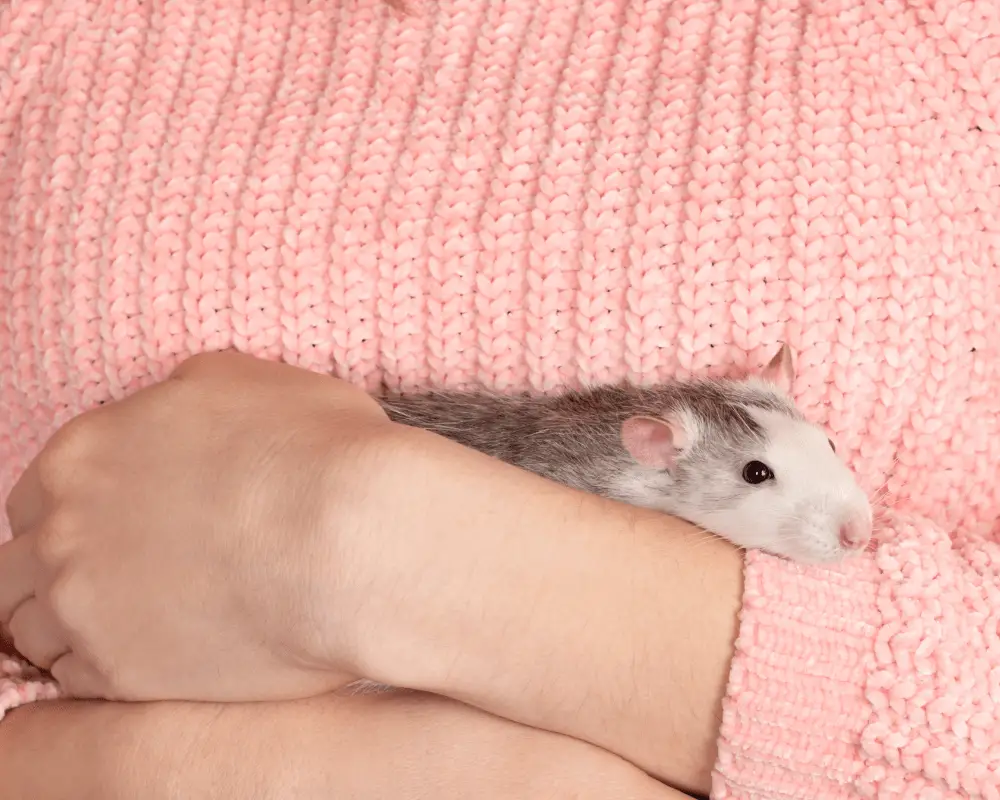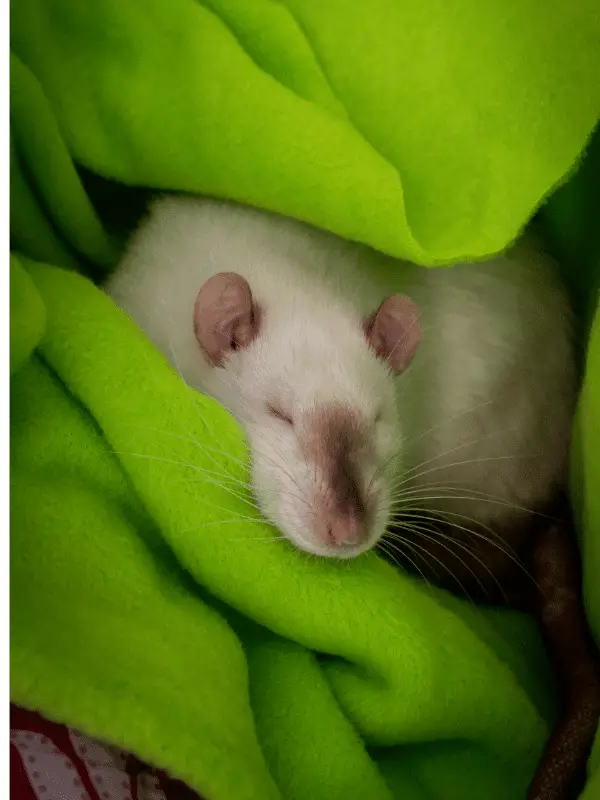It seems easy to offer advice on when to let go to other pet parents, but when it’s your own pet in question, it becomes difficult to think objectively. The line between suffering and not wanting to let them go before they are ready can be clouded by our strong emotional attachment to our pets.
What makes this all the more difficult is the fact that rats will hide signs of pain or illness until it is almost too late. In this article, I included a checklist that may help make the line between holding on and letting go a little clearer to be able to make your decision with an assured heart.
The general recommendation for when to euthanize your pet rat is to base it on assessing their quality of life (QOL). When the level of QOL becomes unacceptable, euthanasia becomes the humane option. Rat Owners can assess QOL based on a rat’s ability to experience the five freedoms of animal welfare (Webster, 1993).
It is imperative that you involve your vet in this discussion. I can offer some guidance from a vet’s perspective, but each individual rat’s situation may differ, and your vet will be able to assess your rat and offer advice for your rat’s specific needs.

How Do I Know If Euthanasia Is The Right Decision?
As rat parents, all we ever want is for our rats to be as happy and healthy as can be. Just think of all the time, energy, and money that we put in to providing the best we possibly can for our beloved rats.
Euthanasia can be an extremely controversial topic, and people often mention that that must be the worst part of my job as a vet. But, truth be told, sometimes it is the best part, and let me explain: pet owners are responsible for the health and wellbeing of their pets.
Severe untreatable pain or terminal illness is not something any pet should ever have to experience for an extended amount of time. Sometimes, the kindest and most loving thing we can do for our beloved pets is to relieve them from the grip of seemingly never-ending pain or terminal illness.
You will be saying yes to heartbreak, but at the same time, you are saying no to an extended time of discomfort for your pet. So in a way, you are taking on pain to save your pet from pain, albeit a different kind of pain.
How Do I Assess My Rat’s Quality Of Life?
No rat owner will disagree when I say that no rat deserves to feel pain. Since this is something I heartily concur with, this will serve as the basis of our discussion on quality of life.
Broken down to the most basic terms, we can assess welfare based on the five freedoms. The five freedoms were developed to evaluate the welfare of animals in human care (Webster, 1993).
- Freedom from hunger and thirst
- Freedom from discomfort
- Freedom from pain, injury, or disease
- Freedom to express normal and natural behavior
- Freedom from fear and distress
Translated into rat terms, we can rephrase them to the following :
- Having access to and being able to eat nutritious food and having access to and being able to drink clean water every day in order to maintain healthy body weight and normal hydration status
- Having a comfortable spot to rest and being able to move normally (a large tumor, for example, will impede comfort)
- Having access to veterinary care when ill or injured
- Being able to forage, hide, climb and express normal rat behavior
- Not being stressed or fearful most of the time and being able to relax and feel safe
If you answer yes to three or more of the following questions, it is an indication that your rat’s quality of life is too low:
- Is your rat is unable to eat or drink by themselves and need to be fed?
- Is your rat uninterested in treats that they used to love eating?
- Is your rat losing weight and seems unable to gain weight despite efforts to feed calorie-rich foods?
- Did they stop grooming themselves (dirty ears, mouth)?
- Do you frequently find urine or fecal soiling on their backside?
- Did they stop approaching you when you call or offer a treat?
- Do they tend to sit or hide in a quiet spot during free-roaming time?
- Does your rat sleep nearly all the time?
- Do they avoid your hand or no longer appreciate being held or cuddled?
- Did your rat stop boggling and bruxing while being petted or during times they used to express this behavior frequently?
- Are they uncharacteristically aggressive toward you or their cage mates?
- Is your rat’s coat scruffy, or do they have slow-healing wounds or tumors larger than 10% of their body?
If you answered yes to more than half of these questions, your rat is having a hard time, and it is time to talk to your vet about euthanasia.
Don’t put too much pressure on yourself to choose the ‘right time’. Rather, it should be seen as a time frame in which euthanasia will be the most compassionate option. Rather let them go while they still have some quality of life than letting them suffer until the point that it becomes unbearable for you both.
If you would like to read more on pain in rats, have a look at this article. You may also find the article on whether cancer is painful to rats valuable.
Signs That You Can Give It Some More Time
If you are in a situation where your rat may appear active and have a healthy appetite the one moment and then seem lethargic and uninterested the next, it’s understandable that you will be split in two on the decision.
Again, I would encourage you to approach your vet regarding the topic. In some cases, offering palliative care in the form of pain medication may help keep them comfortable and happy for some time. This can help you by giving you some time to come to terms with the situation.
As long as the good days outnumber the bad days, you may wish to wait a little longer.
You might find the article on caring for a frail rat and how to know when to take your rat to the vet useful.

Should I Just Leave My Rat to Pass On Their Own?
Some owners may feel that they do not want to interfere and instead let nature take its course. But unfortunately, nature is not always very kind in these situations, and the road of declining to the point of death is not a pleasant or easy one.
Sometimes death will come quick and painless (I discuss more on the topic in this article), but more often, it is a process whereby physiology tries to fight to hold on to life as long as it can.
Another argument I often hear is that they do not want to cause their rats stress by taking them to the vet to be handled by strangers in an unfamiliar environment.
Most vets will give a sedative before giving the lethal injection. Administering the sedative will take no more than 10 seconds. That is 10 seconds of stress to save them hours, days, and possibly weeks of suffering. It is better to have them go after a brief time of stress than after an extended period of discomfort and pain.
What Is The Best Way To Euthanize A Pet Rat?
Euthanasia At Your Vet
This is the most common form of euthanasia and probably the cheapest humane way of euthanasia. Being at the vet practice might be more stressful for your rat due to traveling and being handled by strangers, but it also has many advantages.
For one, you do not have to associate your home or your rat’s enclosure with the event.
Additionally, you may wish not to be around after the sedation has taken effect. Some owners prefer not to witness their pets being euthanized. This is absolutely your personal choice, and your vet will accommodate whatever your wishes are. In these cases, it is best to stick around at least until the sedation or pre-anesthesia has taken effect, after which your rat will no longer be aware of whether you are there or not.
At-Home Euthanasia By A Vet
Some vet practices offer this service. If you feel strongly about keeping your rat in a familiar environment for the procedure, this will be your best option. However, I will not recommend performing the procedure in the view of cage mates.
DIY Carbon Dioxide Euthanasia – DON’T DO IT!
There are a few articles on the internet on how to euthanize rats or other pets at home. This is hugely irresponsible and inhumane to do; let me explain why:
Euthanasia by carbon dioxide is considered a humane method of euthanasia and is commonly used in lab rats participating in scientific research experiments. In these controlled settings, animal welfare requires an adequate level of carbon dioxide to be achieved within the required amount of time and maintained for the required amount of time to perform euthanasia.
It is nearly impossible to achieve a controlled environment with the correct level of carbon dioxide within the correct amount of time and maintain it for the required amount of time in an at-home DIY setting.
If the required concentration of carbon dioxide is not achieved quickly enough, your rat will experience extreme panic and fear as their brain realizes a shortage of oxygen. In short, you will have to witness your rat struggle and panic as they suffocate.
I sadly know a rat owner who did this due to being unable to reach a vet in desperate times due to Covid regulations. His last memory of his beloved rat is, unfortunately not a happy one.
I want to add that despite being a vet and often having to euthanize pets, I will never be able to take the life of a pet I dearly love. In these cases, I will ask a trusted colleague to help.
The burden of taking a life can be a heavy and traumatic one. This is all the more true if it is a life you dearly loved and if it is an act you have no experience in doing (as in working in the animal welfare and veterinary field). Therefore, please save yourself the trauma of causing death inhumanely.
How To Heal A Broken Rat Parent’s Heart
- Realize that it is not because you did something wrong. No matter the circumstances or cause of death, you did the best you could with the information you had, and that is enough.
- Chat to someone. It is never a good idea to hoard negative emotions. Talk to a friend, partner or psychologist. As long as you voice your emotions after a traumatic event. There are many rat parent groups on Facebook that can also help. Many rat owners have gone through this experience and understand the turmoil that you are experiencing and will be able to offer words of advice and comfort.
- Remember the good times. Remembering all the happy times or funny things your rat did can be incredibly healing. Look at old photos and share some of your happy memories of your rat with your close friends or family, or fellow rat enthusiasts.
- Cry a little or a lot – do what you need to do. They were more than just another rat, and nothing could replace the void that they left.
- Give yourself time. After the loss of a beloved pet, it is normal to mourn for some time. Be patient and kind to yourself. It might not feel that way right now, but the horrible feeling you are experiencing now will pass with time.
What Must I do With My Remaining Pet Rats?
Losing a cage mate can be as hard for you as it will be for your remaining rat(s). My article on how rats experience sympathy and grief is interesting and how music may help and tips to calm a stressed rat.
Rats do not do well if kept alone, so if you have only one rat remaining, you need to either rehome them or acquire a new rat or two.
The best general advice I can give is to get two youngsters of the same sex as your remaining rat. In this case, the youngsters can keep each other busy and reduce the likelihood of bullying from the older rat.
If you have one rat remaining, they should be okay for a week or two by themselves as long as you provide lots of cuddles and free-roaming time to keep them occupied.
If you decide to get new rats, they need to be quarantined for at least a week to prevent the introduction of diseases. Thoroughly clean the cage and bedding before introducing new rats and follow a safe rat-introduction protocol to avoid fighting.
If you choose to go the rehoming route, you can browse Facebook for local rat interest groups or look for your nearest rat shelter.
Final Thoughts
I hope that this article helped make this greyscale topic as clear-cut as possible to help you make an informed decision in the best interest of your precious rat.

Resources
- Shomer, N., Allen-Worthington, K., Hickman, D., Jonnalagadda, M., Newsome, J., Slate, A., Valentine, H., Williams, A. and Wilkinson, M., 2020. Review of Rodent Euthanasia Methods. Journal of the American Association for Laboratory Animal Science, 59(3), pp.242-253. https://www.ingentaconnect.com/content/aalas/jaalas/2020/00000059/00000003/art00001#
- Workman, P., Aboagye, E., Balkwill, F., Balmain, A., Bruder, G., Chaplin, D., Double, J., Everitt, J., Farningham, D., Glennie, M., Kelland, L., Robinson, V., Stratford, I., Tozer, G., Watson, S., Wedge, S. and Eccles, S., 2010. Guidelines for the welfare and use of animals in cancer research. British Journal of Cancer, 102(11), pp.1555-1577. Guidelines for the welfare and use of animals in cancer research (nih.gov)
- Webster, A., 1993. Animal welfare: the five freedoms and the free market. BSAP Occasional Publication, 17, pp.45-49. https://www.cambridge.org/core/journals/bsap-occasional-publication/article/abs/animal-welfare-the-five-freedoms-and-the-free-market/55E646CC5DD089D1774CC6516299CD7C
